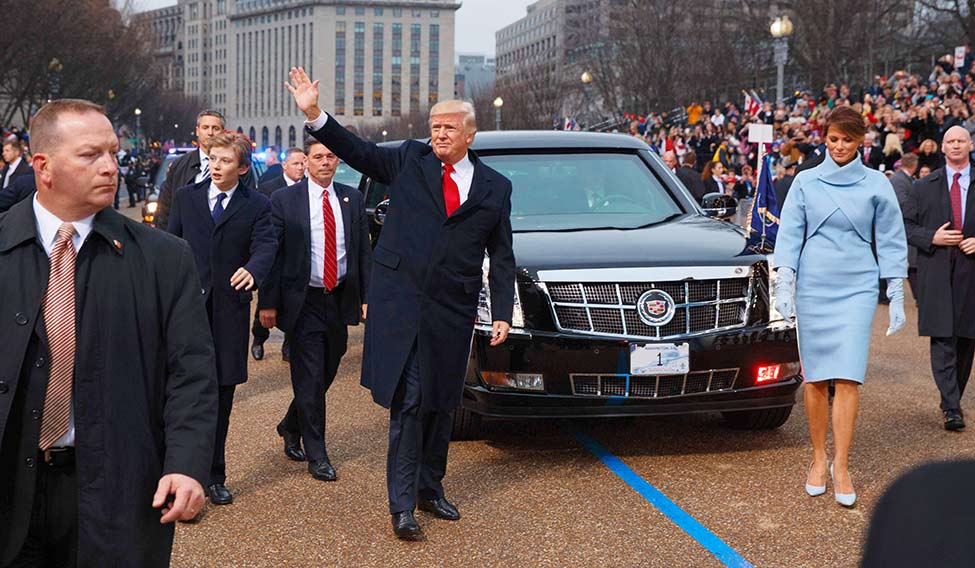And so, Dennis the Menace grew up and became the 45th president of the United States! I was in the US when Donald J. Trump first put in his quixotic bid. I am here again at his inauguration. Perhaps, I should stop visiting the US!
One outlier has succeeded another. The older political establishment has disintegrated as past certainties give way to present bewilderment. There is an unprecedented churning—social and economic—as America adjusts itself to becoming a nation it does not recognise, where 59 million immigrants in the last half-century have reduced the traditional white majority to a mere 62 per cent of the population that is likely to become a minority within the next three decades. This is a nation struggling to recognise itself. It first turned to the most unlikely candidate in 2008. And has now turned right around to the most unlikely candidate at the opposite end of the political spectrum.
So, who is this new president? POLITICO magazine of Washington, DC, put together a group of three biographers of Trump. Their startling consensus conclusion is that the new president is “the same person that we have always seen: the consummate classroom troublemaker, a vain insecure bully; and an anti-institutional schemer, as adept at ‘gaming the system’ as he is unashamed,” a participant adding that Trump is “uniquely insusceptible to advice and creative thinking”. (Readers are reminded that we are talking about Trump, not a leader nearer home!)
One of the biographers, Michael D’Antonio, said the man was driven by “his own emotional needs and his own insecurities” while another, Tim O’Brien, pointed to his hollowness: “The only things that keep him awake at night historically are money, sex, food and revenge... it’s not like he ponders the deeper meaning of life.” The third biographer, Gwenda Blair, says, “This is all about him completely dominating the news cycles—the use of Twitter to distract from any real questions, emphasis on loyalty, vituperation towards anyone he sees as disloyal or doesn’t toe his line....”
In a joint interview with The Times of the United Kingdom and Bild of Germany, Trump has laid bare his bizarre articulation when not prompted by a speech-writer. Sample this: “I looked at something, uh, I’m not allowed to show you— but I just looked at Afghanistan and you look at the Taliban—and you take a look at every, every year, it’s more, more, more....” he trails off, then adds, “and you say, now what’s going on?” Yes, indeed, what is going on in such a muddled mind?
Then why have the Americans chosen such a man to lead them? Not because Trump has laid out any carefully thought-out plan to rejuvenate the country, says Sarwar Lateef, World Bank economist and Indian resident of Washington, DC, in the current issue of Governance Now, but more because theirs is a cri de cœur, a cry of despair from the heart. They turned out in huge numbers to vote for Obama because he said, “Yes, We Can.” As he departs into the sunset, much of America thinks, “No, He Couldn’t.”
Economists know there has been an uptick in the closing years of the Obama regime, indeed quite an uptick that Trump will no doubt claim as his own, but that uptick is nothing compared with the downward slide of 9 million households losing their brand new homes because banks granted them loans they knew the borrower would not be able to pay back. And while the new poor, overwhelmingly black, have tumbled into ghettos “trapped in a downward spiral” of “high crime rates, declining standards of teaching in schools, and poor health care”, Lateef points to the longer term issues of the share of manufacturing in GDP crumbling by almost half over the last 35 years to just 12 per cent (even India has a marginally higher share!), leading to some 7 million job losses, largely in the ‘Rust Belt’—the former industrial states now inexorably shutting down—where Trump triumphed hugely.
Pew Research, says Lateef, has found that where average real wages today have no greater purchasing power than in 1979, incomes of the top 10 per cent have grown by 121 per cent, those of the top 1 per cent by 205 per cent, and that of the very top 0.001 per cent by a mind-blowing 636 per cent. It is this fear of almost everyone falling further while a tiny sliver of the obscenely rich soar ever upwards that has led to this deep, pervasive sense of being cheated over the American promise. It is this burgeoning resentment that Trump has tapped into with his otherwise meaningless slogan, Make America Great Again.
And how does he propose to achieve that goal? With a cabinet of plutocrats whose combined wealth exceeds nine billion dollars, the highest of any cabinet ever! Thus is the fence set to eat the grass as “the ethically challenged” nominees battle their way through a slough of damning allegations of financial improprieties at their confirmation hearings. Where Trump, equating great wealth with great brains, claims his cabinet as the one with the “highest IQ” ever, Paul Krugman, the Nobel Prize winner and popular columnist, looking to all the skeletons tumbling out of hidden cupboards, calls the Trump team a “kakistocracy”. I had to look it up: it means a government of the very worst!
Trump has begun his term getting into an unprecedented fight with the media, calling them “among the most dishonest human beings on earth” because they proved with photographs that the crowds at his inauguration—which he called “the biggest ever”—were not larger than the crowds at Obama’s tryst. Over the post-inauguration weekend, massive demonstrations, far exceeding Trump’s triumphal moment, all around this country and the world, spontaneously sponsored by feisty women quite independent of any organisation, have shown how deeply divided the US remains, and how uncertain is the prospect of Trump even completing his first term.













